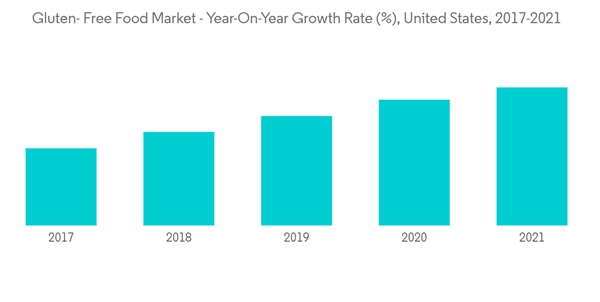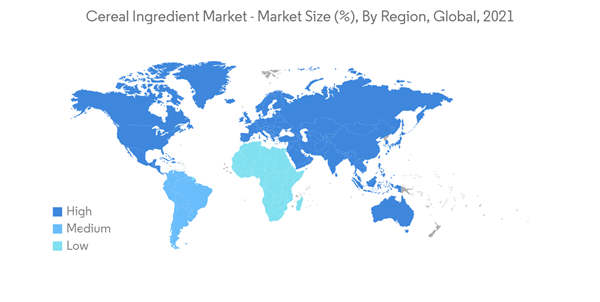The cereal ingredients market witnessed positive growth during the COVID-19 pandemic, even with increased prices of cereals across the world. The Food and Agriculture Organization's Price Index Report indicates a 35% increase in the prices of cereals and cereal-related products. Instant food supplements like cereals ran out of stock across the markets from time to time as consumers' interest shifted toward instant meals. The major players offered new flavored cereals with nutritional choices like gluten-free and ingredients with more fiber content for better immune health.
This market mainly includes wheat, rice, barley, and oats, with insignificant shares. The nutritive quality of the ingredients drives the market. Also, the increasing demand for ready-to-eat products has been boosting the usage of these ingredients. Additionally, the growing demand for health-promoting benefits of organic cereals is a significant factor fueling the organic segment of the market. Apart from the food industries, the increasing demand from the livestock industry is also driving the market.
Research to confirm the nutritional benefits of the ingredients and developments such as fortification, genetic modification, and gene-nutrient interactions are playing an essential role in boosting the cereal ingredients market, in order to meet the requirements and preferences of the consumers to enhance the market growth further. For instance, fortification of white flour with folic acid has been proposed in the United Kingdom to decrease the rate of NTD, as stated by the British Nutrition Foundation. Also, the government initiated favorable policies regarding fortification regulations, which may further boost the market.
Key Market Trends
Increase in Demand for Products with Health Benefits
The market for gluten-free cereal-based products has witnessed an increasing trend due to the rising risk of celiac disease (CD). For example, the prevalence of CD in the United States varies from 4.5% among first-degree relatives of CD-affected patients to 0.5%-1.0% in the general population and is increasing over time. A strict gluten-free diet is the only available treatment for CD; it relieves symptoms, achieves mucosal healing, and prevents disease complications. This is majorly driving the gluten-free sector of the market. Also, according to Mayo Clinic, 3.1 million Americans are shifting toward gluten-free diets, where 72% of them are classified as people without celiac disease avoiding gluten (PWAG). These people have been ditching gluten without a celiac diagnosis in order to join the trend of gluten-free consumption.
Asia-Pacific is the Fastest-growing Region of the Market
In the Asia-Pacific region, China dominates the market, contributing the maximum market share, followed by Japan and Australia. According to NBSC, It is estimated that an average Chinese individual consumes more than 100 kilograms of cereals in a year. This is due to the change in breakfast cereal consumption patterns and inclination toward healthier products. Also, increased adoption of the Western lifestyle is one of the driving factors for market sales. Product development of low-carb, high-fiber, multigrain, and fortified breakfast cereals that appeal to health-conscious consumers has triggered the market growth. In addition to functional health benefits, incorporating natural ingredients, such as natural preservatives, antioxidants, and enzymes in breakfast cereals is on the rise. Expanding retail distribution channels are another factor driving sales in rural and relatively small cities.
Competitive Landscape
The cereal ingredients market is competitive in nature, having a large number of domestic and multinational players competing for market share. Companies are focusing on new product launches with healthier ingredients/organic claims, along with acquisitions, mergers, partnerships, and expansions as their key marketing strategies. For instance, Associated British Foods PLC acquired Dorset Cereals, a British breakfast food manufacturer, in 2014, which complemented the company’s existing Jordans cereals and Ryvita crispbread brands. The major players include Archer Daniel Midland Company, Associated British Foods, Bunge Limited, Groupe Limagrain Limited, and RiceBran Technologies.
Additional Benefits:
- The market estimate (ME) sheet in Excel format
- 3 months of analyst support
This product will be delivered within 2 business days.
Table of Contents
Companies Mentioned (Partial List)
A selection of companies mentioned in this report includes, but is not limited to:
- Archer Daniels Midland Company
- Associated British Foods PLC
- Bunge Limited
- Groupe Limagrain Holding
- RiceBran Technologies
- Cargill Inc.
- SunOpta Inc.
- Kellogg's
- CII Foods
- General Mills










